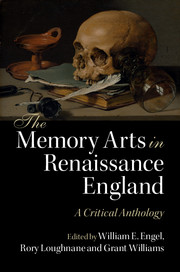Book contents
- Frontmatter
- Dedication
- Contents
- List of figures
- Acknowledgements
- A note on abbreviations
- Introduction
- PART I The art of memory
- PART II Rhetoric and poetics
- PART III Education and science
- PART IV History and philosophy
- PART V Religion and devotion
- PART VI Literature
- Introduction to Part VI
- POETRY
- PLAYS AND PROSE
- VI.11 Thomas Nashe, The Unfortunate Traveller (1594)
- VI.12 William Shakespeare, selected works
- VI.13 John Webster, selected works
- VI.14 Thomas Tomkis, Lingua: or the Combat of the Tongue (1607)
- VI.15 Mary Wroth, Urania (1621)
- VI.16 John Earle, Microcosmography (1628)
- VI.17 John Jones, Adrasta (1635)
- VI.18 Thomas Browne, Hydriotaphia, Urn-Burial (1658)
- VI.19 Anon., Crackfart and Tony; or, Knave and Fool (1680)
- VI.20 John Bunyan, The Pilgrim's Progress (1681)
- Index
- References
VI.18 - Thomas Browne, Hydriotaphia, Urn-Burial (1658)
from PLAYS AND PROSE
Published online by Cambridge University Press: 05 August 2016
- Frontmatter
- Dedication
- Contents
- List of figures
- Acknowledgements
- A note on abbreviations
- Introduction
- PART I The art of memory
- PART II Rhetoric and poetics
- PART III Education and science
- PART IV History and philosophy
- PART V Religion and devotion
- PART VI Literature
- Introduction to Part VI
- POETRY
- PLAYS AND PROSE
- VI.11 Thomas Nashe, The Unfortunate Traveller (1594)
- VI.12 William Shakespeare, selected works
- VI.13 John Webster, selected works
- VI.14 Thomas Tomkis, Lingua: or the Combat of the Tongue (1607)
- VI.15 Mary Wroth, Urania (1621)
- VI.16 John Earle, Microcosmography (1628)
- VI.17 John Jones, Adrasta (1635)
- VI.18 Thomas Browne, Hydriotaphia, Urn-Burial (1658)
- VI.19 Anon., Crackfart and Tony; or, Knave and Fool (1680)
- VI.20 John Bunyan, The Pilgrim's Progress (1681)
- Index
- References
Summary
About the author
Thomas Browne (1605–82) studied medicine throughout the continent, his travels nurturing a cosmopolitan outlook on religion and the world expressed in his Religio medici (1643). After returning to England, he settled down to a country practice in Norwich, occupying himself in his spare time with the pursuits of a collector, antiquarian and naturalist.
About the text
Occasioned by the local discovery and exhumation of the Walsingham burial urns, this text begins as an antiquarian inquiry into the history of funeral rituals in order to ascertain the artefacts’ origins but gradually transposes itself to a solemn theo-philosophical key, in which the uncertainty of reviving the past and the futility of domesticating temporality haunt mortality. Here Browne is famed for his demanding magniloquent style; his aureate diction and marmoreal allusions aspire to a gravitas verging on orotund engorgement. The first two chapters consider the archaeological facets of burial, while the fourth and final chapters rise to speculative heights, the third pivoting between the two sections. The fifth chapter, from which the excerpts come, spins out a baroque fantasia on the utter vanity of commemoration. Hydriotaphia, derived from the Greek words for water-urn (hydria) and burial (taphe), was published with the Garden of Cyrus, a companion piece that conversely thematises living creation – the surprisingly omnipresent ‘quincunx’ pattern of five points disclosed in the botanical and horticultural spheres.
The arts of memory
Browne sets himself apart from humanists and antiquarians who serve a ‘resurrective memory’, which revivifies the remnants of dead culture for present purposes. Antiquarianism makes, in the words of Camden, the stones speak for themselves, whereas Browne's painstaking archaeological method might be said to smother its artefacts in muteness. He aporetically voids memory devices. What colours his thinking is his particular brand of fideistic scepticism developed in Religio medici, but while Browne in that intellectual memoir sought to erect a ‘memorial unto me’, Hydriotaphia intones a canticle to oblivion. Browne's most pressing irony concerns his grandiloquent, even baroquely antiquated language, which strikes a kind of elegiac note. Urn-Burial paradoxically attempts to engrave the final word on humanity's failure to come up with an enduring epitaph.
Textual notes
Thomas Browne, Hydriotaphia, urne-buriall, or, a discourse of the sepulchrall urnes lately found in Norfolk (London, 1658), F4r–F5v.
- Type
- Chapter
- Information
- The Memory Arts in Renaissance EnglandA Critical Anthology, pp. 349 - 352Publisher: Cambridge University PressPrint publication year: 2016



